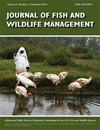气候变化下部分迁移的环境驱动因素和适应后果
IF 0.9
4区 环境科学与生态学
Q4 BIODIVERSITY CONSERVATION
引用次数: 0
摘要
动物迁徙是为了获取随季节变化的资源或逃避当地的不利条件。部分(灵活)迁移策略为动物提供了一种适应性权衡,在这种策略中,个体可以根据与避免不利条件相关的潜在益处来选择是否承担迁移的能量成本。部分迁徙模式可能会因人为的土地利用和气候变化而改变,这可能会减少迁徙的益处,并导致不可预测的迁徙提示。我们通过分析北美五大湖区四个不同种群的档案遥测数据(1986-2014 年),研究了白尾鹿部分迁徙的原因、后果和个体水平的变化。我们假设,如果迁徙的成本大于收益,那么迁徙行为就会减少。迁徙行为从1987年的75%下降到2014年的11%,与种群身份无关。迁徙型白尾鹿的年死亡率较高,而最低气温的升高对存活率有积极影响,但并不影响迁徙。我们的研究结果表明,随着时间的推移,白尾鹿的迁徙行为正在减少,这可能与冬季严重程度下降有关。大型哺乳动物迁徙行为的消失可能会对生态系统产生影响,我们的研究强调了更好地了解和保护这些迁徙传统的必要性。本文章由计算机程序翻译,如有差异,请以英文原文为准。
Environmental drivers and fitness consequences of partial migration under climate change
Animals migrate to access seasonally variable resources or to escape unfavorable local conditions. Partial (flexible) migration strategies offer animals a fitness trade-off in which individuals may choose whether to incur the energetic costs of migration depending on the potential benefits associated with avoiding adverse conditions. Partial migration patterns may shift due to anthropogenic land use and climate change, possibly reducing the benefits of migration and resulting in unpredictable migration cues. We examined causes, consequences, and changes in individual-level partial migration of white-tailed deer Odocoileus virginianus by analyzing archival telemetry data (1986-2014) across four distinct populations in the Great Lakes region, North America. We hypothesized that if the costs of migration outweigh benefits, we would see migratory behavior decline. Migratory behavior declined from 75% in 1987 to 11% in 2014 independent of population identity. Annual mortality was higher for migratory white-tailed deer, while increasing minimum temperatures positively impacted survival but did not influence migration. Our results suggest that migratory behavior in white-tailed deer is declining over time and may be associated with declining winter severity. The loss of migratory behavior in large mammals may have ecosystem-level impacts and our study emphasizes the need to better understand and conserve these migratory traditions.
求助全文
通过发布文献求助,成功后即可免费获取论文全文。
去求助
来源期刊

Journal of Fish and Wildlife Management
BIODIVERSITY CONSERVATION-ECOLOGY
CiteScore
1.60
自引率
0.00%
发文量
43
审稿时长
>12 weeks
期刊介绍:
Journal of Fish and Wildlife Management encourages submission of original, high quality, English-language scientific papers on the practical application and integration of science to conservation and management of native North American fish, wildlife, plants and their habitats in the following categories: Articles, Notes, Surveys and Issues and Perspectives. Papers that do not relate directly to native North American fish, wildlife plants or their habitats may be considered if they highlight species that are closely related to, or conservation issues that are germane to, those in North America.
 求助内容:
求助内容: 应助结果提醒方式:
应助结果提醒方式:


